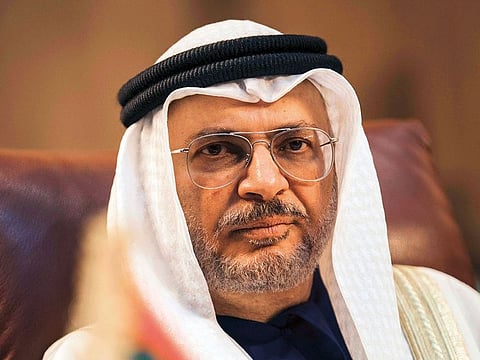Return to Iran’s nuclear deal no longer viable: Gargash
UAE minister addresses regional conference on Gulf security in Abu Dhabi

Abu Dhabi: Military confrontation in the Gulf region is neither a rational nor viable option just as the return to the Joint Comprehensive Plan of Action [JCPOA] nuclear deal with Iran, Dr Anwar Gargash, Minister of State for Foreign Affairs, said on Monday.
“Amid US-Iran tensions and considering Tehran’s expansionist policies, the Gulf security challenges will continue and so they must be managed properly until a new, more stable regional order is established,” Dr Gargash told a regional conference on Gulf security, held by the Emirates Centre for Strategic Studies and Research.
Dr Gargash told the conference titled “Gulf Security: identifying and Confronting the Challenges” that as military confrontation is not a rational, viable option, the return to the old former nuclear deal with Iran is extremely out of reach.
“The signatories of the deal have left it behind and come to the conclusion that it falls short of aspirations and does not address the concerns over Iran’s nuclear programme and other aspects of the Iranian regional policies. However, the political settlement, as part of a clear roadmap to boost stability of the region and benchmark its way to prosperity, remains the viable option,” Dr Gargash said.
Gargash reiterated that the pursuit of a permanent solution in the region and moving towards a productive relationship with Iran would require addressing its “worrying and destabilising behaviour”.
“Iran must permanently end its pursuit of nuclear weapons, cease the development and proliferation of ballistic and other missiles, end support for violent proxy groups and respect the sovereignty of other nations,” Gargash said, spelling out the essential elements for any discussions towards a new and enhanced agreement.
Dr Gargash said such discussions would go beyond the JCPOA and include the Gulf states that have so much at stake.
Permanent solution
He said the present phase is meant to de-escalate tensions, but any permanent solution in the region must offer a political vision in which the GCC countries partake and address Iran’s missile programme and its regional policies and meddling in the internal affairs of the region’s countries.
Affirming that stability has been a central objective of UAE foreign policy, Gargash said that on the long-run the GCC countries should reach understanding that fends off crises and that is based on the time-honoured principles of international relations mainly respect of sovereignty, non-interference in the internal affairs and security and prosperity for all.
Gargash said that the Qatar crisis must end “but this must be through addressing its causes”.
The conference comprised three main panels. The first panel, titled ‘Geopolitics of the Gulf Region’, saw two papers presented. Commander Erich Frandrup, US Navy Senior Fellow, Atlantic Council, US, examined ‘Gulf Maritime Security and the Iranian Threat’, while the second presentation, from Khalid Al Zaatar, Saudi writer, political analyst and researcher in Middle East affairs, touched on ‘Turkey’s Foreign Policy in the Region’. In the second panel, ‘Challenges to Gulf Development’, Prof. Waleed Khalil Zubari, an expert in water resources management at Arabian Gulf University, Kingdom of Bahrain, discussed ‘The Region’s Water and Food Security’, while Eng. Awaidha Murshed Al Marar, Chairman of the Department of Energy, Abu Dhabi, examined ‘The Energy Transition: Implications for Gulf States’. The third panel, titled ‘Regional Stability and Defense Diplomacy’, saw Dr Fahad Al Shelimi, a political and strategic analyst and researcher from Kuwait, explored ‘Prospects for Resolving the Qatar Crisis’. The second paper, by Dr Khaled Mohammed Batarfi, a professor at Alfaisal University, and a writer and political analyst from Saudi Arabia, examined ‘The Role of International Alliances in the Region: US, Russia and China’.


